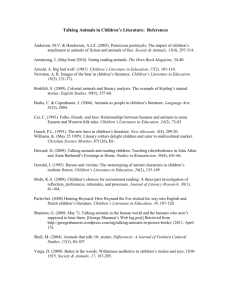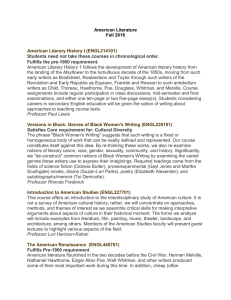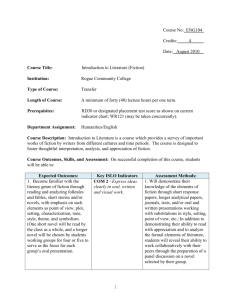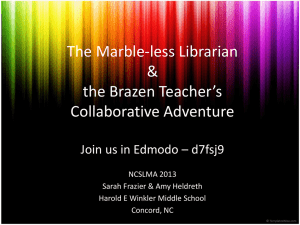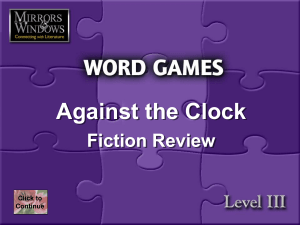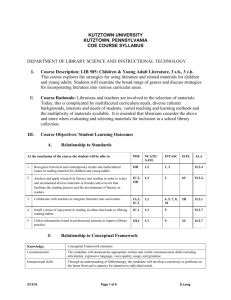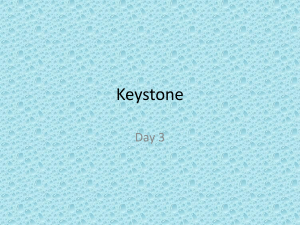SPRING 2015 – AMERICAN ENGL2141 American Literary History I
advertisement
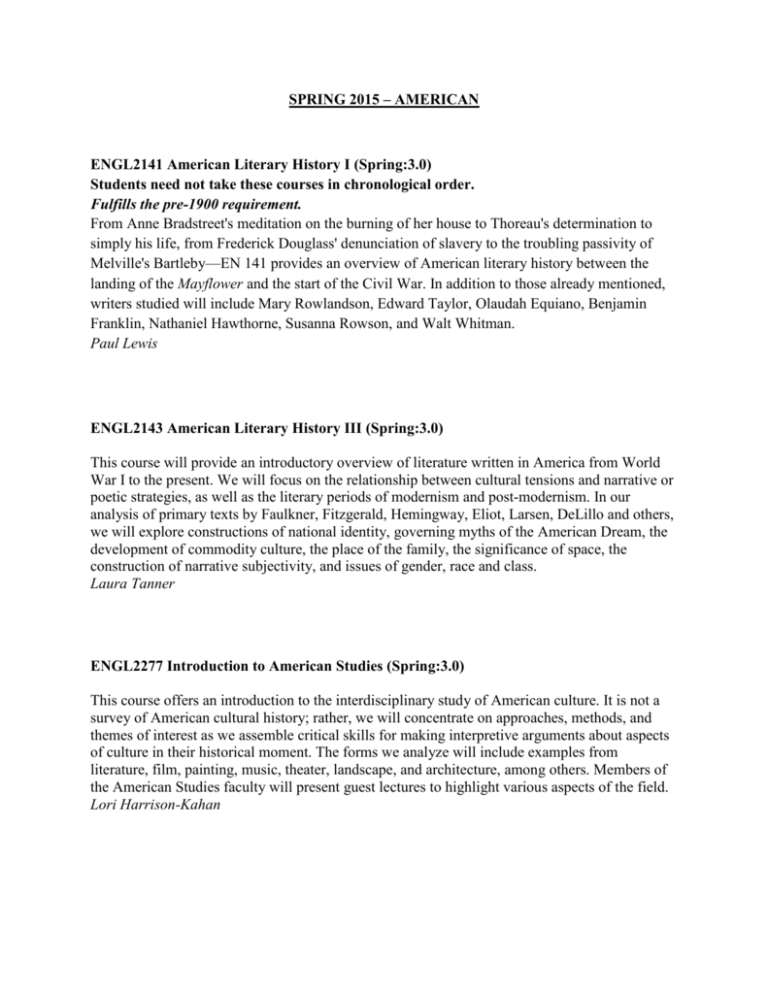
SPRING 2015 – AMERICAN ENGL2141 American Literary History I (Spring:3.0) Students need not take these courses in chronological order. Fulfills the pre-1900 requirement. From Anne Bradstreet's meditation on the burning of her house to Thoreau's determination to simply his life, from Frederick Douglass' denunciation of slavery to the troubling passivity of Melville's Bartleby—EN 141 provides an overview of American literary history between the landing of the Mayflower and the start of the Civil War. In addition to those already mentioned, writers studied will include Mary Rowlandson, Edward Taylor, Olaudah Equiano, Benjamin Franklin, Nathaniel Hawthorne, Susanna Rowson, and Walt Whitman. Paul Lewis ENGL2143 American Literary History III (Spring:3.0) This course will provide an introductory overview of literature written in America from World War I to the present. We will focus on the relationship between cultural tensions and narrative or poetic strategies, as well as the literary periods of modernism and post-modernism. In our analysis of primary texts by Faulkner, Fitzgerald, Hemingway, Eliot, Larsen, DeLillo and others, we will explore constructions of national identity, governing myths of the American Dream, the development of commodity culture, the place of the family, the significance of space, the construction of narrative subjectivity, and issues of gender, race and class. Laura Tanner ENGL2277 Introduction to American Studies (Spring:3.0) This course offers an introduction to the interdisciplinary study of American culture. It is not a survey of American cultural history; rather, we will concentrate on approaches, methods, and themes of interest as we assemble critical skills for making interpretive arguments about aspects of culture in their historical moment. The forms we analyze will include examples from literature, film, painting, music, theater, landscape, and architecture, among others. Members of the American Studies faculty will present guest lectures to highlight various aspects of the field. Lori Harrison-Kahan ENGL3306 Reading the Atomic Age (Spring:3.0) This class will consider the literature and culture of Cold War-era America and Britain, paying special attention to the place of nuclear weapons and nuclear power within the culture of the time. We will study the political, social and cultural history of the period in both Britain and America in order to explore and analyze the ways that literature and film, particularly, emerge from historical reality in forms that can challenge the status-quo. Possible topics include apocalyptic science fiction and the representation of nuclear protest groups. Texts may include:, The Four-Gated City, Kiss Me Deadly, Underworld and Godzilla. Rowena Clarke ENGL3329 Hard Fiction (Spring:3.0) “In essence,” writes Dave Eggers, “there are some people who feel that fiction should be easy to read. . . . On the other hand, there are those who feel that fiction can be challenging, generally and thematically, and even on a sentence-by-sentence basis . . . for the rewards can be that much greater when one’s mind has been exercised and thus (presumably) expanded.” This course is about the second kind—hard fiction by American writers like Faulkner, Nabokov, Pynchon, David Foster Wallace, John Barth, Donald Barthelme. Reading for the adventurous. James Wallace ENGL4918 Advanced Topic Seminar: Literary Boston (Spring:3.0) Walk the streets of Old Boston in this course that explores familiar and forgotten chapters of literary history. Spend a night at the Federal Street Theatre during the 1790s. Search early Boston magazines for forgotten treasures. Meet the poet buried on Boston Common. Find out why Edgar Allan Poe called members of the Boston literati “Frog-Pondians.” And watch the American Renaissance flower. Authors studied will include Judith Sargent Murray, Lydia Maria Child, Charles Sprague, Henry Wadsworth Longfellow, Nathaniel Hawthorne, and Poe— Bostonians all! Visits to literary sites and explorations of archival materials will help transport us back in time. Paul Lewis ENGL5510 Contemporary American Women Writers (Spring: 3.0) Focusing primarily on fiction written by American women in the last twenty five to thirty years, this course will explore issues of identity, embodiment, family, friendship, race, domestic space, ethnicity, power and violence, as well as gender. In approaching each literary text, we will aim to situate it within the context of contemporary American cultural tensions and to explore in detail its construction as a work of art that manipulates language and literary form. Authors may include Toni Morrison, Jhumpa Lahiri, Marilynne Robinson, Gish Jen, Nicole Krauss, Louise Erdrich, Lorrie Moore and others. Laura Tanner ENGL5539 Advanced Topic Seminar: History, Memory & Culture in American Literature (Spring:3.0) This course focuses on nineteenth, twentieth and twenty-first century fiction, memoir, and experimental nonfiction, examining what writers and critics have had to say about the psychological and narrative dimensions of memory in American literature. Texts considered include Willa Cather's My Antonia (a novel made to look like a memoir); Scott Fitzgerald and Ernest Hemingway's modernist fiction; Fae Mae Ng's bone (a book narrated in reverse time); war memoirs by Stephen Crane, Dexter Filkins, or Michael Herr; and Walter Benjamin's, Tillie Olsen's or John Edgar Wideman's blending of ethnic autobiography and experimental fiction. Christopher Wilson

